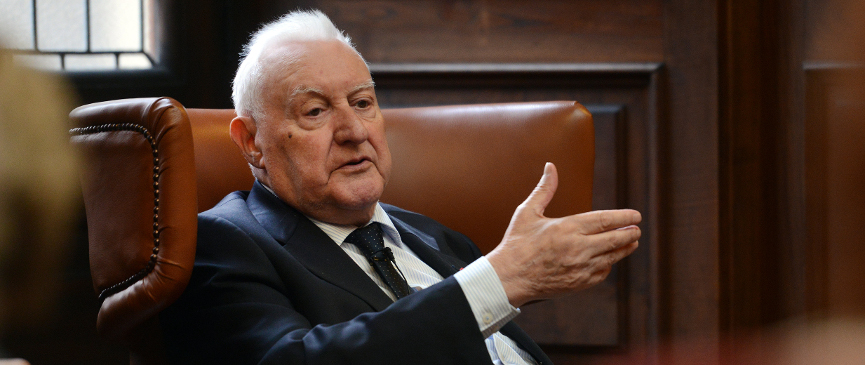You are in:
Laureates
Start of main content
Joseph Pérez
Prince of Asturias Award for Social Sciences 2014

On appearing here before Your Majesties to receive this award, it is requisite to recall the debt universal civilization has with Spain. I shall do so by citing one of the most outstanding geniuses of Spain’s Golden Age.
In his book The Names of Christ, the Augustinian friar known as Fray Luis de León provides us with some thoughts on how to establish peace among men and nations. Fray Luis begins with St Augustine’s definition: peace is the tranquillity that precedes order. Peace thus consists of two elements: order and serenity.
Order, in the sense that all things must keep their proper place; each one should pay others the respect and courtesy that is due to them. Peace also demands serenity; that is to say, concord, consent, overt or tacit acceptance: “order by and in itself, without rest does not bring peace; nor do rest and serenity, if order is absent”.
In other words, peace –to be truly so– supposes justice, without which it would be no more than the mere absence of war or, more exactly, it would be a sort of war that has yet to be openly declared. The requirement of serenity –of acceptance and consent– breaks the impasse that the mere need for order may entail. When the current order is no longer accepted, another form of organization is needed to restore serenity. It hence follows that order in itself is not an absolute value that must be maintained at all costs; it is only valid insofar as it is accompanied by serenity and deserves the freely given endorsement of all parties. Order and serenity are thus in a dialectical relationship; order without serenity degenerates into armed peace, tyranny, despotism; serenity without order leads to immoral, reprehensible situations. True peace requires that order and serenity walk hand in hand.
Moreover, order supposes the existence of several people to be ordered and ranked, while serenity implies an agreement being reached between several parties. Peace thus refers to a plurality of beings or a division of the individual human being. “We can define three kinds of peace: in the first, a relationship of harmony exists between man and God; in the second, when man lives in harmony with himself; and third, when man is not clashing with his fellow man”.
The first kind of peace implies the submission of the individual to God and to His commandments; the second, submission to reason and self-control; the third, justice: “the respect of the rights of each individual, and the granting of justice to each without struggle or delay”.
These three kinds of peace are closely bound to one another: “being at peace with ourselves is of great help if we want to be at peace with others”. Therefore, true peace lies in “being at peace with ourselves” and not in external causes, such as the force of law.
Thus, for Fray Luis, peace excludes resignation of any kind in the face of injustice. To the contrary, it supposes a relentless struggle to root out the causes of conflict; to struggle for justice, freedom and truth. It means attempting to restore order, an order that has been violated and has become an instigator of discord. It therefore seems that Fray Luis anticipated Kant’s Perpetual Peace Project: peace rests on law; that is, on the acceptance by the individual of a freely accepted legal order. Fray Luis de León’s humanism consequently coincides with 18th-century Enlightenment. That is Spain’s contribution to European civilization.
End of main content
Sección de utilidades
Fin de la sección de utilidades
- Legal document Legal document (Access key 8)
- | Privacy policy Privacy policy (Access key )
- | Social networks ???en.portal.pie.menu107.title???
- | Cookies ???en.portal.pie.menu110.title???
- | Site map Site Map (Access key 3)
- | Contact Contact (Access key )
- | XHTML 1.0
- | CSS 2.1
- | WAI 'AA
© Copyright 2024. FUNDACIÓN PRINCESA DE ASTURIAS
 Watch interactive
Watch interactive


